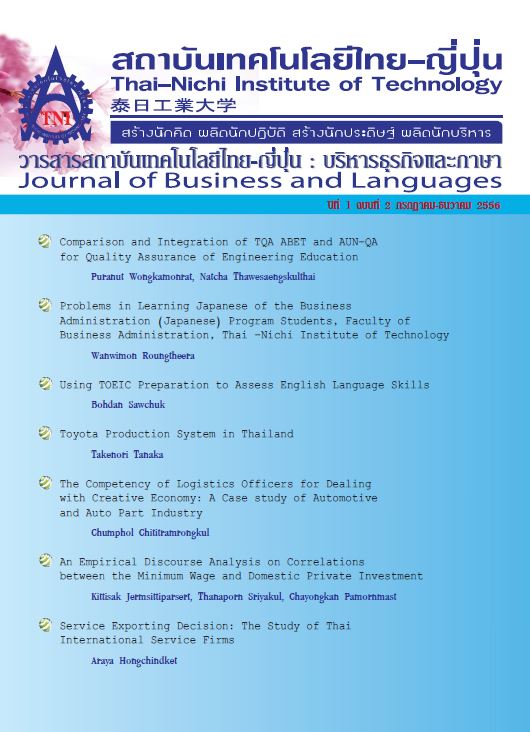Comparison and Integration of TQA ABET and AUN-QA for Quality Assurance of Engineering Education
Main Article Content
Abstract
Quality assurance in engineering education is vital to ensure that the expectation of stakeholders including graduates, employers of the engineering graduates, and professors are met and hence enhance their satisfaction level. The diversity of criteria can make it difficult for an institution to choose the appropriate criteria for their institutions. The purpose of this paper are (1) to compare the three international quality assurance criteria of Thailand Quality Award (TQA Criteria), Accreditation Board for Engineering and Technology (ABET Criteria) and ASEAN University Network-Quality Assurance (AUNQA Criteria) and (2) to integrate these three assessments for program QA framework development at the engineering institution. The study used in-depth literature review on these criteria. The authors compared the criteria scoped at the program level of teaching and learning using a matrix diagram and an affinity diagram. Similarities and differences among the three widely adopted QA criteria in ASEAN are presented. The comparative result shows that TQA Criteria focused on overall QA management system while AUN-QA Criteria focused on the learning and teaching process but ABET Criteria focused on program outcomes. This article contributes to distinguish the TQA, ABET, and AUN-QA and proposes a conceptual framework of the integrated QA System.
Article Details
Article Accepting Policy
The editorial board of Thai-Nichi Institute of Technology is pleased to receive articles from lecturers and experts in the fields of business administration, languages, engineering and technology written in Thai or English. The academic work submitted for publication must not be published in any other publication before and must not be under consideration of other journal submissions. Therefore, those interested in participating in the dissemination of work and knowledge can submit their article to the editorial board for further submission to the screening committee to consider publishing in the journal. The articles that can be published include solely research articles. Interested persons can prepare their articles by reviewing recommendations for article authors.
Copyright infringement is solely the responsibility of the author(s) of the article. Articles that have been published must be screened and reviewed for quality from qualified experts approved by the editorial board.
The text that appears within each article published in this research journal is a personal opinion of each author, nothing related to Thai-Nichi Institute of Technology, and other faculty members in the institution in any way. Responsibilities and accuracy for the content of each article are owned by each author. If there is any mistake, each author will be responsible for his/her own article(s).
The editorial board reserves the right not to bring any content, views or comments of articles in the Journal of Thai-Nichi Institute of Technology to publish before receiving permission from the authorized author(s) in writing. The published work is the copyright of the Journal of Thai-Nichi Institute of Technology.
References
C. Kistan, “Integrating quality assurance systems in a merged higher education institution,” Quality Assurance in Education., vol. 13, pp. 241-250, 2005.
D. T. Gamage, “The impact of quality assurance measures on student services at the Japanese and Thai private universities,” Quality Assurance in Education., vol. 16, pp. 181-198, 2008.
M. A. Badri, H. Selim, K. Alshare, E. E. Grandon, H. Younis and M. Abdulla, “The Baldrige Education Criteria for Performance Excellence Framework: Empirical test and validation,” International Journal of Quality & Reliability Management., vol. 23, pp. 1118-1157, 2005.
F. Mizikaci, “A systems approach to program evaluation model for quality in higher education,” Quality Assurance in Education, vol. 14, pp.37-53, 2006.
Office of the Higher Education Commission. (2009) Higher Educational Information. [Online]. Available: https://interapp.mua.go.th /CHEapp2552/INFO_UNIV/stat_search/download.php?file_id=200905131516.xls&stat_id=101&id_member=/
L. A. Zampetakis and L. Tsironis, “Creativity development in engineering education: the case of mind mapping,” Journal of Management Development., vol. 26, pp. 370-380, 2007.
A. P. Foguet, S. O. Josa and A. S. Carranza, “Develop education and engineering A framework for corporating reality of developing countries into engineering studies,” International Journal of Sustainability in higher education., vol. 6, pp. 278-303, 2006.
Office of Thailand Quality Award, Thailand Quality Award: Criteria for performance excellence, 1st ed., Bangkok, Thailand: Rein Thong Best of The Nation, 2009.
(2009) Thailand Quality Award: TQA. [Online]. Available: https:// www.tqa.or.th/
R. M. Felder and R. Brent, “Designing and Teaching Courses to Satisfy the ABET Engineering Criteria,” Journal of Engineering Education, vol. 92, pp.7-25, 2003.
S. Sarin, “Quality Assurance in engineering education: A comparison of EC-2000 and ISO-9000,” Journal of Engineering Education., vol. 89, pp. 495-500, 2000.
Engineering Accreditation Commission. (2008) Criteria for Accrediting Engineering Programs : Effective for Evaluations During the 2009-2010 Accreditation Cycle. [online]. Available:
https://www. abet.org/Linked%20Documents-UPDATE/Criteria%20and%20PP/E20%10 2009%001EAC%20Criteria%.08-01-2012pdf/
D. Thawesaengskuthai, Comparative QA system of HE in Thailand, ASEAN and European Countries, 2005.
D. Thawesaengskuthai, “Application of TQM&ISO Concepts for QA System Development in Higher Education of ASEAN University Network (AUN-QA) and CU-QA 84,” Best Practices
in Services & Education., pp.525-529, 2004.
ASEAN University Network. ASEAN University Network-Quality Assurance Guidelines, 1st ed., Bangkok, Thailand: Tammada, 2004.
G. M. Bornman, “Programme review guidelines for quality assurance in higher education,” International Journal of Sustainability in Higher Education., vol. 5, pp. 372-383, 2004.
J. F. Welsh and S. Dey, “Quality measurement and quality assurance in higher education,” Quality Assurance in Education., vol. 10, pp. 17-25, 2002.


